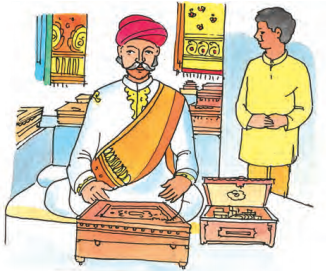NCERT Solutions for Class 6 English Honeysuckle Poem Chapter 1 A House, A Home are part of NCERT Solutions for Class 6 English. Here we have given NCERT Solutions for Class 6 English Honeysuckle Poem Chapter 1 A House, A Home.
| Board | CBSE |
| Textbook | NCERT |
| Class | Class 6 |
| Subject | English Honeysuckle Poem |
| Chapter | Chapter 1 |
| Chapter Name | A House, A Home |
| Number of Questions Solved | 14 |
| Category | NCERT Solutions |
NCERT Solutions for Class 6 English Honeysuckle Poem Chapter 1 A House, A Home
Stanzas For Comprehension
Read the following extracts and answer the questions that follow choosing the best option from among the given ones.
1.
What is a house ?
It’s brick and stone
and wood that’s hard.
Some window glass
and perhaps a yard.
It’s eaves and chimneys
and tile floors
and stucco and roof
and lots of doors.
word-Notes:
Yard open space, आँगन। Eaves-the overhanging lower edges of a roof, ओलती। Tile floors-पक्के फर्श। Stucco-outer covering, प्लास्टर।
हिन्दी अनुवाद :
घर क्या है ? यह ईंट, पत्थर और मजबूत लकड़ी से बनी एक इमारत है। इसमें कुछ शीशे की खिड़कियाँ और शायद एक आँगन भी है। इसमें ओलती, चिमनी और पक्के फर्श होते हैं। इसमें कई दरवाजे, प्लास्टर की हुई दीवारें और छत होती हैं।
Paraphrase :
What is a house ? It is a building made of brick, stone and hard wood. There are some glass windows and perhaps a yard also. There are eaves and chimneys and tiled floors. There are many doors with plastered walls and roof.
Multiple Choice Questions
1. According to the poet a house is
(a) different from a home
(b) same as home
(c) only brick and stone
(d) only furniture
2. A house is made of
(a) people
(b) emotions
(c) love
(d) material
3. Brick, stone, wood etc. are required to make a
(a) home
(b) house
(c) family
(d) neighbours
4. A house becomes a home with
(a) roof
(b) doors
(c) windows
(d) the people
5. The word ‘stucco’ means the same as
(a) walls
(b) furniture
(c) plaster
(d) floor
Answers
- (a) different from a home
- (d) material
- (b) house
- (d) the people
- (c) plaster
2.
What is a home ?
It’s loving and family
and doing for others.
It’s brothers and sisters
and fathers and mothers.
It’s unselfish acts
and kindly sharing
and showing your loved ones
you’re always caring.
Word-Notes :
Unselfish-selfless, निस्वार्थ। Acts-deeds, कार्य। Caring-concerned, चिंतित।
हिन्दी अनुवाद :
घर क्या है ? यह एक स्नेही परिवार होता है जिसमें लोग दूसरों के लिए काम करते हैं। इसमें भाई, बहन, मातायें और पिता होते हैं। इसमें होने वाले निस्वार्थ कार्य और दयापूर्वक हर काम में हाथ बटाना, और अपने प्रियजनों को यह अहसास दिलाना कि तुम उनकी चिंता करते हो, इसे घर बनाता है।
Paraphrase :
What is a home ? It is the place where a loving family lives. They work for one another. A family may have brothers, sisters, fathers and mothers. The unselfish acts and kindly sharing, showing your concern each other make it a family.
Multiple Choice Questions
1. According to the passage the home is a
(a) house
(b) loving family
(c) furniture
(d) building
2. The members of a family act
(a) in self interest
(b) against each other
(c) for some common interest
(d) for the good of each other
3. A family is made of the people who
(a) are brothers and sisters
(b) are parents
(c) care for each other
(d) live together
4. The members of a family
(a) live together
(b) talk to each other
(c) share every thing
(d) work together
5. The word ‘caring’ in the passage means
(a) kind
(b) careful
(c) bold
(d) truthful
Answers
- (b) a loving family
- (d) for the good of each other
- (c) care for each other
- (c) share every thing
- (a) kind
Textual Questions
Working with the Poem
(A)
Do you agree with what the poet says ? Talk to your partner and complete these sentences
- A house is made of ______________________________________________
- It has ______________________________________________
- A home is made by ______________________________________________
- It has ______________________________________________
(B)
Now complete these sentences about your house and home.
- My house is ______________________________________________
- The best thing about my home is ______________________________________________
Answers
(A)
- A house is made of brick, stone and hard wood.
- It has glass windows, a yard, eaves, chimneys, tiled floors, roof and doors.
- A home is made by a loving family.
- It has brothers and sisters and fathers and mothers.
(B)
- My house is made of brick, stone, wood and iron. It has a yard, doors and windows.
- The best thing about my home is that it consists of a loving family. Here people care for one another and work unselfishly for each other.
We hope the NCERT Solutions for Class 6 English Honeysuckle Poem Chapter 1 A House, A Home help you. If you have any query regarding NCERT Solutions for Class 6 English Honeysuckle Poem Chapter 1 A House, A Home, drop a comment below and we will get back to you at the earliest


